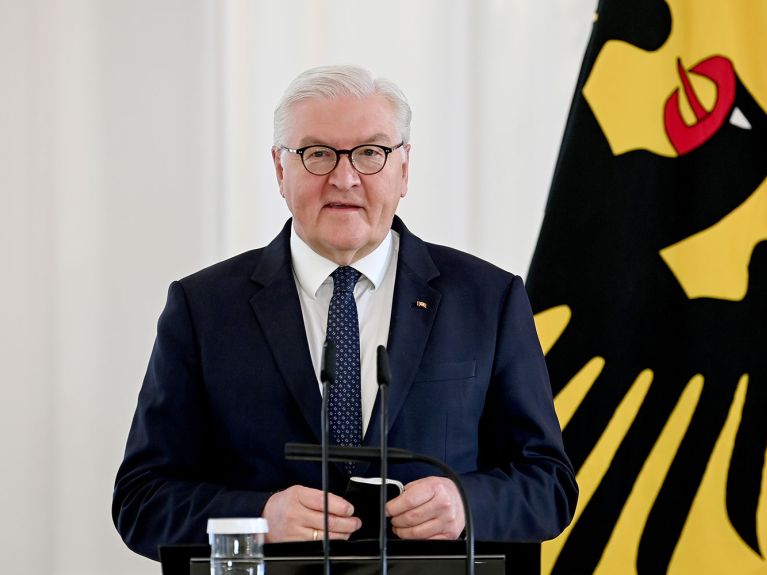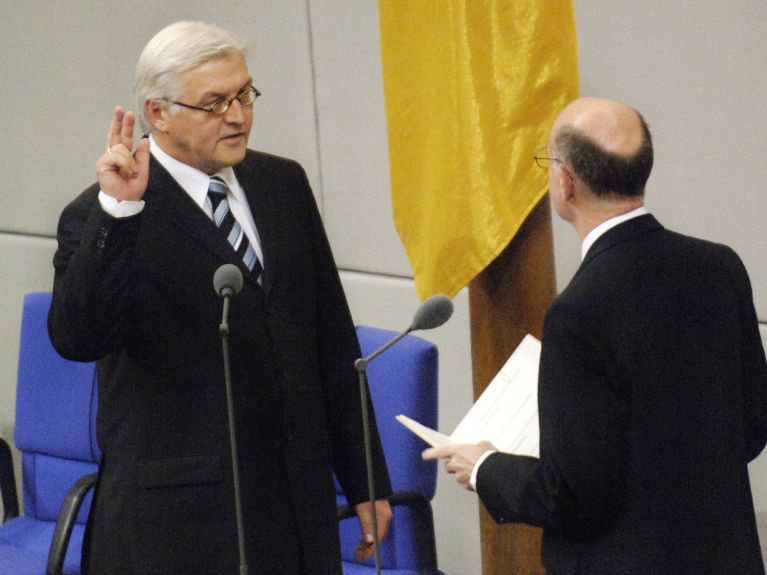Federal President with wide support
Frank-Walter Steinmeier has been voted in for a second 5-year term in office. He enjoys respect across party lines.

At an unusually early stage, in May 2021, German President Frank-Walter Steinmeier announced that he wished to remain Germany's head of state for another five years. "I would like to stand for election for a second term as Germany's Federal President," Steinmeier said four months before the German parliamentary elections at the end of September. At that time, it was still completely unclear whether he would receive the necessary support. But weeks before the official election of the German President on 13 February 2022, it already seemed certain that Steinmeier would not have to move out of Bellevue Palace, the President's official residence in Berlin. Now it’s official: Steinmeier has been voted in for a second 5-year term in office.
Not only the SPD, the Greens and the FDP, who formed the new Federal Government with Chancellor Olaf Scholz at the beginning of December, pledged support for Steinmeier. In early January, the leaders of the opposition parties CDU and CSU also recommended the incumbent's re-election. From that moment on at the latest, Steinmeier had no need to worry about the vote in the Federal Assembly on 13 February. The Assembly, which only meets to elect the President, is made up of the members of the Bundestag and the same number of representatives of the Länder. In other words, its composition depends on the majority situations in the Bundestag and the state parliaments.
Steinmeier's first term began in early 2017

On 12 February 2017, the Federal Assembly elected Steinmeier as the 12th Federal President of Germany with about 75 percent of votes cast. Previously, the SPD politician had been Germany's Foreign Minister in the government of CDU/CSU and SPD headed by Chancellor Angela Merkel (CDU). Steinmeier succeeded Joachim Gauck as Federal President, after Gauck decided not to run for a second term. In five years at the latest, Steinmeier's time in the highest office of state will also come to an end because, according to Germany's Basic Law (constitution), a Federal President can only be re-elected once.
Steinmeier has been married to Elke Büdenbender since 1995, and the couple have one daughter. Büdenbender is a judge and plans to return to the Berlin Administrative Court on a part-time basis during her husband's second term in office as from spring 2022.
From Head of the Chancellery to Foreign Minister

Steinmeier, who was born on 5 January 1956 in Detmold, North Rhine-Westphalia, also studied law at the University of Giessen, where he was awarded a doctorate in 1991. In the same year, he began working as a media-law and media-policy officer in the State Chancellery of Lower Saxony in Hanover. At the beginning of his political career, he was closely associated with Gerhard Schröder, who later became German Chancellor. From 1993, Steinmeier initially headed the office of the then Minister-President of Lower Saxony. When the SPD became the strongest party in the 1998 federal election and Schröder became Chancellor, Steinmeier also moved to Berlin. He was initially State Secretary at the Federal Chancellery and in 1999 took on the influential post of Head of the Chancellery.
Steinmeier also remained in the Federal Government when CDU politician Angela Merkel was first elected chancellor in 2005. He took over the post of Foreign Minister, and from 2007 also served as Vice Chancellor. He ran unsuccessfully as the SPD's candidate for Chancellor in the 2009 federal election. At that time, Merkel remained Chancellor and headed a government of CDU, CSU and FDP for four years. During this period, Steinmeier was chairman of the Social Democratic parliamentary group in the Bundestag and thus Merkel's opponent in the opposition. When the governing coalition of CDU/CSU and SPD was re-established after the 2013 federal election, he became Foreign Minister for a second time, and remained in this post until his election as German President in 2017.
Commitment to democracy and social cohesion
After five years as Federal President, Steinmeier enjoys respect across party lines. In recent years, he has received recognition above all for his commitment to democracy and social cohesion. In the light of the pressures resulting from the coronavirus pandemic, in his Christmas address at the end of 2021, Steinmeier urged his listeners: "In a democracy, we don't all have to agree. But please let us remember: we are one country! After the pandemic, we must still be able to look each other in the eye. And we still want to live together after the pandemic."

